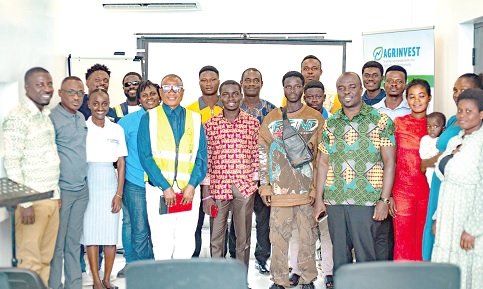The Council for Scientific and Industrial Research (CSIR)-Crop Research Institute (CRI) is implementing a farmers-based Agric initiative, which it launched in 2024 to transform the lives of farmers beyond the field.
Under its Engaging Local Communities in Endangered Trees and Minor Crops Utilisation for Biodiversity Conservation and Livelihood Enrichment (EMBRACE Project), the initiative is expected to transform the lives of 1,250 households by 2027.
The project, which involves value addition and diversification, is also expected to increase incomes by at least 40 per cent.
Communities
Since its launch, EMBRACE has reached 41 communities in Ghana and 25 in Kenya. Overall, 25 communities across both countries have been selected as project demonstration hubs.
The EMBRACE project team is led by the Project Lead and Coordinator, Dr Clement Oppong Peprah; the Co-Project Lead & Financial Coordinator, Dr Jeannette Aduhene-Chinbuah; the Agroforestry Systems Implementation Component Lead, Dr Agr. Felix Frimpong; the Seed Systems Component Lead, Dr Hillary Mireku Botey; the Silviculture Component Lead, Dr Atta Kwesi Senior Aidoo, and the Agroforestry Systems Implementation Co-Component Lead, Dr Eric Owusu Danquah.
Light
This came to light at this year's CSIR-CRI Open Day in Kumasi, which drew 242 participants from across Ghana’s agricultural sector.
From traditional leaders (Nananom) to officials from the Ministry of Food and Agriculture, the Ministry of Environment, Science, Technology and Innovation, banks, seed companies, academia, farmers and civil society organisations, the gathering was a vibrant celebration of innovation, collaboration and community.
Among the many highlights of the day, the exhibition mounted by the EMBRACE Project stood out, a bold initiative that weaves together traditional knowledge and modern science to restore ecosystems, conserve biodiversity, and improve rural livelihoods in Ghana and Kenya.
At the Open Day, visitors were drawn to EMBRACE’s striking farmstead model, a one-hectare model farm that will be replicated in 25 participating communities.
Learning ground
Designed as both a learning ground and a productive system, the model integrates.
Indigenous tree species for reforestation and cultural value.
Under its diversification initiative, the project is to focus on neglected and underutilised crops with high nutritional and economic potential.
There is also beekeeping to boost pollination and generate income, and mushroom cultivation as a sustainable protein source, as well as snail rearing to enhance household nutrition and markets.
The farmsteads are more than demonstration plots. They are laboratories where farmers can experiment, adapt and innovate, proving that regenerative agriculture can deliver food security, income and resilience while restoring degraded landscapes.
The EMBRACE booth also showcased seeds of forgotten minor and underutilised crops carefully conserved in its germplasm bank at Fumesua in the Ashanti Region.
These resilient yet often overlooked crops embody both biodiversity and cultural heritage.
"Reviving them is central to EMBRACE’s strategy: creating farming systems that are not only productive but also sustainable, diverse, and adapted to local conditions," Dr Peprah said.
So far, EMBRACE has secured one-hectare plots in five communities per region in both Ghana and Kenya for nurseries and model farms, except for one region in Ghana where 1.5 hectares has been allocated.

